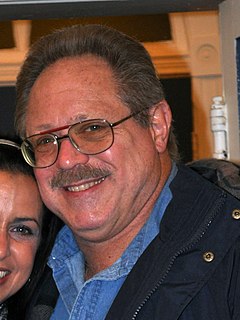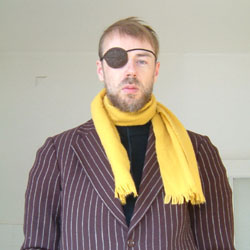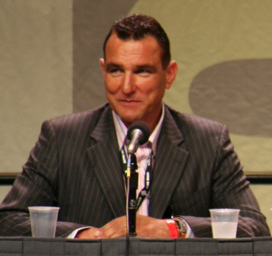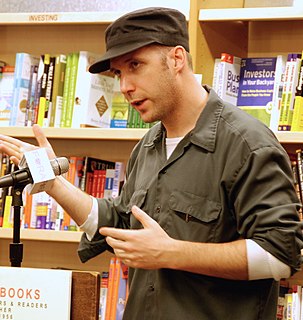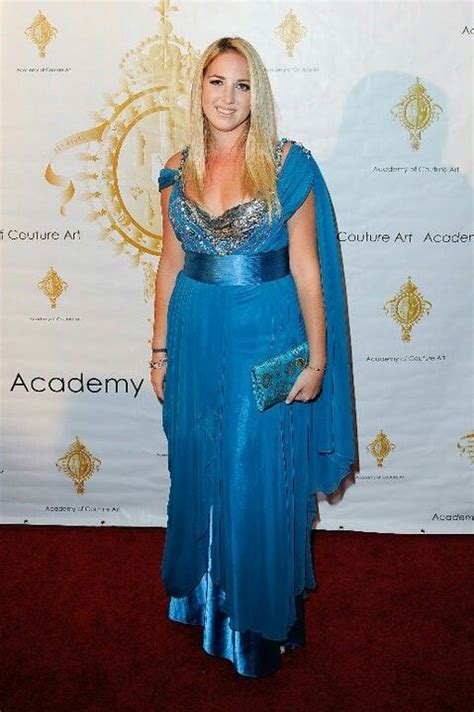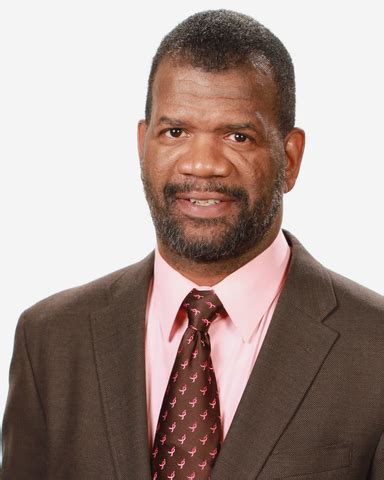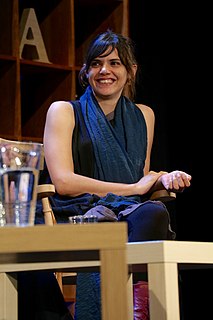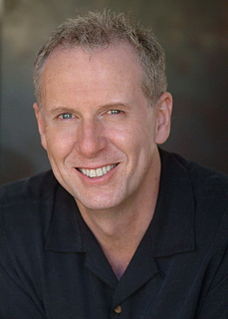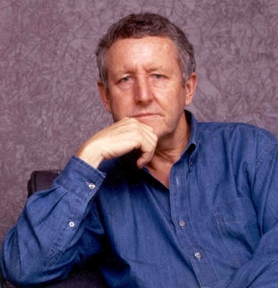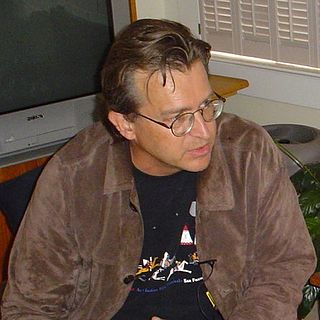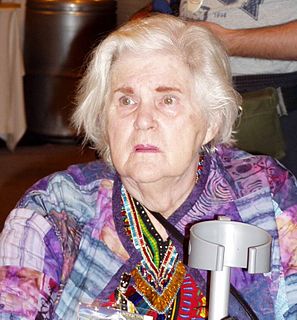Top 901 Metaphor Quotes & Sayings - Page 14
Explore popular Metaphor quotes.
Last updated on December 4, 2024.
Because we do not understand the brain very well we are constantly tempted to use the latest technology as a model for trying to understand it. In my childhood we were always assured that the brain was a telephone switchboard...Sherrington, the great British neuroscientist, thought the brain worked like a telegraph system. Freud often compared the brain to hydraulic and electromagnetic systems. Leibniz compared it to a mill...At present, obviously, the metaphor is the digital computer.
For my generation - the "Children of Nixon," as I call us in the book - the Lebanese civil war was an iconic event. Downtown Beirut became a metaphor for so many things: man's inhumanity to man, what Charles Bukowski called "the impossibility of being human." It shaped our perceptions of war and human nature, just as Vietnam did for our parents. We used it to understand how the world works.
The idea that you might end up in a job that doesn't allow you to be who you are, over the course of a lifetime, is still one of the most chilling nightmares to me. It's a good metaphor for fears I have about losing my soul in some accidental, mundane way. So, to me, these jobs that my characters have are very loaded. They immediately suggest a complex character to me, a woman who is, say, a secretary, but also a vigilante on behalf of her own soul.
I think working with actors is a little bit how a chef would work with a potato or a piece of meat. You have to kind of have a look at the potato or the piece of meat and see what kind of possibilities are in the ingredient. I know I'm using the wrong metaphor. I think my job is to see what potato is there and from there, just work under their conditions.
I believe in the theory of evolution, but I believe as well in the allegorical truth of creation theory. In other words, I believe that evolution, including the principle of natural selection, is one of the tools used by God to create mankind. Mankind is then a participant in the creation of the universe itself, so that we have a closed loop. I believe that there is a level on which science and religious metaphor are mutually compatible.
When we were kids, you picked up a little paper and put it on a stick; and when you waved it back and forth, you understood the power of air underneath the wings. In that way, a child begins to understand abstraction, poetry, metaphor, symbolism. You play with the materials you have and use your imagination to make them into something else. That what's so sad about having everything on a little screen - it's not physical and dimensional, and that seems backward.
I'm bored with DJs. Anybody that puts the title DJ in front of their name immediately turns me off. I prefer the term "sampling," because it has both the dilettante side, like someone tasting wine or caviar, but also functions as a kind of litmus paper dipped into culture. And the whole semi-legality of sampling is very interesting as well. So a DJ is not really creative enough for me to be an appropriate metaphor.
You see, I know change
I see change
I embody change
All we do is change
Yeah, I know change
We are born to change
We sometimes regard it as a metaphor
That reflects the way things ought to be
In fact change takes time
It exceeds expectations
It requires both now and then
See, although the players change
The song remains the same
And the truth is...
You gotta have the balls to change
I have a true aversion to teaching. The perennial business of a professor of mathematics is only to teach the ABC of his science; most of the few pupils who go a step further, and usually to keep the metaphor, remain in the process of gathering information, become only Halbwisser [one who has superficial knowledge of the subject], for the rarer talents do not want to have themselves educated by lecture courses, but train themselves. And with this thankless work the professor loses his precious time.
If you take a glass of water and separate it from its source - the ocean - then pour the water away from its source and ask it to sustain life, it flitters away. It just evaporates. It can't sustain life. That's a metaphor for us when we separate ourselves from our source and believe that God is separate from us.
I really loved it because it really informed his way of seeing my character and the story. If you look closely he always had this metaphor of an egg, of a little chick pecking her way out of a shell, and in one scene in the kitchen there are all these white plates on a wall and then in the middle there is a yellow plate so even that looks like an egg. And a lot of the furniture was almost sculpted in that way as well. It was really cool to see that.
The number one metaphor I have in my mind for writing a screenplay is that...you're trying to climb a mountain blindfolded. And the funny thing about that is, you think, 'Okay, that's hard because you're climbing up a rock face, and you don't know where you're going, and you don't know where the top is, you can't see what's below you...' But actually the hardest part about climbing a mountain blindfolded is just finding the mountain.
Not only did this new pornography industry change the way men look at women and how we relate to sex, how we sell stuff, and not only did it change America's cultural landscape - it's also this incredible metaphor for a market-based economy. The great pyramid scheme that America has become. I felt like in were larger themes in terms of culture and economics that could be addressed.
A spacecraft is a metaphor of national inspiration: majestic, technologically advanced, produced at dear cost and entrusted with precious cargo, rising above the constraints of the earth. The spacecraft carries our secret hope that there is something better out there-a world where we may someday go and leave the sorrows of the past behind. The spacecraft rises toward the heavens exactly as, in our finest moments as a nation, our hearts have risen toward justice and principle.
I think I've learned a lot about how to make movies, and particularly about how to edit movies by thinking about how similar problems are resolved in other forms. The issues in all forms are the same in an abstract sense, aren't they? Characterization, abstraction, metaphor, passage of time... Whether it's a movie, a novel, a play, or a poem, those issues exist. And each person resolves them differently.
Remus Lupin was supposed to be on the H.I.V. metaphor. It was someone who had been infected young, who suffered stigma, who had a fear of infecting others, who was terrified he would pass on his condition to his son. And it was a way of examining prejudice, unwarranted prejudice towards a group of people. And also, examining why people might become embittered when they're treated that unfairly.
Homesickness is not always a vague, nostalgic, almost beautiful emotion, although that is somehow the way we always seem to picture it in our mind. It can be a terribly keen blade, not just a sickness in metaphor but in fact as well. It can change the way one looks at the world; the faces one sees in the street look not just indifferent but ugly... perhaps even malignant. Homesickness is a real sickness--the ache of the uprooted plant.
The American Heritage Dictionary defines crucible as "a place, time, or situation characterized by the confluence of powerful intellectual, social, economic, or political forces; a severe test of patience or belief; a vessel for melting material at high temperatures." A crucible was the vessel in which medieval alchemists attempted to turn base metals into gold. That the alchemists inevitably failed in their audacious attempts doesn't denigrate the power of the crucible as a metaphor for the circumstances that cause an individual to be utterly transformed.
This is the highest honour of the Church, that, until He is united to us, the Son of God reckons himself in some measure imperfect. What consolation is it for us to learn, that, not until we are along with him, does he possess all his parts, or wish to be regarded as complete! Hence, in the First Epistle to the Corinthians, when the apostle discusses largely the metaphor of a human body, he includes under the single name of Christ the whole Church.
In some ways, I saw the garden as a metaphor for certain aspects of my life. A leader must also tend his garden; he, too, plants seeds, and then watches, cultivates, and harvests the results. Like the gardener, a leader must take responsibility for what he cultivates; he must mind his work, try to repel enemies, preserve what can be preserved, and eliminate what cannot succeed.
In a way, her strangeness, her naiveté, her craving for the other half of her equation was the consequence of an idle imagination. Had she paints, or clay, or knew the discipline of the dance, or strings, had she anything to engage her tremendous curiosity and her gift for metaphor, she might have exchanged the restlessness and preoccupation with whim for an activity that provided her with all she yearned for. And like an artist with no art form, she became dangerous.
I write every day, for most of the day, so it's just about turning into metaphor whatever's going on in my life, in the world, and in my head. Every nightmare, every moment of grief or joy or failure, is a moment I can convert into cash via words. I use everything. Turning life into stories is how I make sense of my experience.
When she is older she will see in these resemblances a regrettable uniformity among individuals (they all stop at the same spots to kiss, have the same tastes in clothing, flatter a woman with the same metaphor) and a tedious monotony among events (they are all just an endless repetition of the same one); but in her adolescence she welcomes these coincidences as miraculous and she is avid to decipher their meanings.
Translation is entirely mysterious. Increasingly I have felt that the art of writing is itself translating, or more like translating than it is like anything else. What is the other text, the original? I have no answer. I suppose it is the source, the deep sea where ideas swim, and one catches them in nets of words and swings them shining into the boat... where in this metaphor they die and get canned and eaten in sandwiches.
Sometimes, when we're terrified of embracing our true calling, we'll pursue a shadow calling instead. That shadow career is a metaphor for our real career. Its shape is similar, its contours feel tantalizingly the same. But a shadow career entails no real risk. If we fail at a shadow career, the consequences are meaningless to us. Are you pursuing a shadow career?
Young people are dazzled by the brilliancy of antithesis, and employ it. Matter-of-fact men, and those who like precision, naturally fall into comparisons and metaphor. Sprightly natures, full of fire, and whom a boundless imagination carries beyond all rules, and even what is reasonable, cannot rest satisfied even with hyperbole. As for the sublime, it is only great geniuses and those of the very highest order that are able to rise to its height.
Depression, when it's clinical, is not a metaphor. It runs in families, and it's known to respond to medication and to counseling. However truly you believe there's a sickness to existence that can never be cured, if you're depressed you will sooner or later surrender and say: I just don't want to feel bad anymore. The shift from depressive realism to tragic realism, from being immobilized by darkness to being sustained by it, thus strangely seems to require believing in the possibility of a cure.
Poetry is a way of being alone without feeling alone. It allows you to experience another mind, I suppose. And it does that more fully than other art forms, I think. It doesn't simply describe an experience, or a feeling, or a moment: it evokes it through, say, rhythm or tone or diction or metaphor. It creates a mood. A poem communicates before it is understood; it's not a fully paraphrasable form, which distinguishes it from other forms of writing.
Whereas if you were writing an op-ed piece or an essay, somebody would be asking, "What's your point?" With poetry you can stay in a moment for as long as you want. Poetry is about metaphor, about a thing standing in for something else. It's the thing that opens out to something else. What that something else is changes for readers. So what's on the page - it falls away.
There's an economy in sports that I always think is a useful metaphor for acting. You have an objective. You're trying to win, and of course, you want to do well. You want to use good techniques so you enforce it, but also you don't do things you don't have to do. It's very economical, and I think that in acting the most economical way through a scene is always the best. It's active. There is the sense of the fight and you want to win.
A short story is a sprint, a novel is a marathon. Sprinters have seconds to get from here to there and then they are finished. Marathoners have to carefully pace themselves so that they don't run out of energy (or in the case of the novelist-- ideas) because they have so far to run. To mix the metaphor, writing a short story is like having a short intense affair, whereas writing a novel is like a long rich marriage.
One of the reasons that metaphor and symbolism are important in books is because they are also important to life. Like, for example say you're in high school and you're a boy and you say to a girl: "Do you like anyone right now?" - that's not the question you're asking. The question you're asking is, "do you like me right now."
If gold has been prized because it is the most inert element, changeless and incorruptible, water is prized for the opposite reason -- its fluidity, mobility, changeability that make it a necessity and a metaphor for life itself. To value gold over water is to value economy over ecology, that which can be locked up over that which connects all things.
Reading with an eye towards metaphor allows us to become the person we’re reading about, while reading about them. That’s why there is symbols in books and why your English teacher deserves your attention. Ultimately, it doesn’t matter if the author intended the symbol to be there because the job of reading is not to understand the author’s intent. The job of reading is to use stories as a way into seeing other people as a we ourselves.
I think there are shades of political songs; some are more subtle and can be more effective for being subtle, for being more metaphorical. I've written a lot of songs like that, where it's not really clear if it's a war song or a relationship song. The metaphor can be the most powerful thing of all, but sometimes you have to speak more clearly to more people, and I think this is one of those times.
It occurred to me that there have always been selkie women: women who did not seem to belong to this world, because they did not fit into prevailing notions of what women were supposed to be. And if you did not fit into those notions, in some sense you weren't a woman. Weren't even quite human. The magical animal woman is, or can be, a metaphor for those sorts of women.
In a sense everything that is exists to climb. All evolution is a climbing towards a higher form. Climbing for life as it reaches towards the consciousness, towards the spirit. We have always honored the high places because we sense them to be the homes of gods. In the mountains there is the promise of... something unexplainable. A higher place of awareness, a spirit that soars. So we climb... and in climbing there is more than a metaphor; there is a means of discovery.
According to Shiva, life is in the end about fixing holes. Shiva didn't speak in metaphors. fixing holes is precisely what he did. Still, it's an apt metaphor for our profession. But there's another kind of hole, and that is the wound that divides family. Sometimes this wound occurs at the moment of birth, sometimes it happens later. We are all fixing what is broken. It is the task of a lifetime. We'll leave much unfinished for the next generation.
The line-by-line, sequential, continuous form of the printed page slowly began to lose its resonance as a metaphor of how knowledge was to be acquired and how the world was to be understood. "Knowing" the facts took on a new meaning, for it did not imply that one understood implications, background, or connections. Telegraphic discourse permitted no time for historical perspectives and gave no priority to the qualitative. To the telegraph, intelligence meant knowing of lots of things, not knowing about them.
There is no metaphor for death. All comparisons are odious, but I'll do one anyway. We all have these moments of harsh clarity where we realize that something is gone, whether that is youth, whether that is someone we care about, whether that is where we literally lose someone we care about to death. Or we end a relationship that we thought would last forever, or have one ended for us. We all have these moments in life where it seems impossible to fill up the time that we have left for us, and yet we have to do it somehow.
I watched as Humphrey Bogart’s character used beans as a metaphor for the relative unimportance in the wider world of his relationship with Ingrid Bergman’s character, and chose logic and decency ahead of his selfish emotional desires. The quandary and resulting decision made for an engrossing film. But this was not what people cried about. They were in love and could not be together. I repeated this statement to myself, trying to force an emotional reaction. I couldn’t. I didn’t care. I had enough problems of my own.
To Forget Venice is a tour de force of ventriloquism. Elegant, contemporary, and wry, the voice at its center is also capable of disarming flights of imagination as it enters and inhabits other lives across time and gender. The glittering, fetid city emerges as a complex metaphor for the human heart’s simultaneous tenderness and capacity for cruelty, its ‘silver glow / a local specialty: filth / disguised as ornament.’ This Venice is unforgettable.
The last level of metaphor in the Alice books is this: that life, viewed rationally and without illusion, appears to be a nonsense tale told by an idiot mathematician. At the heart of things science finds only a mad, never-ending quadrille of Mock Turtle Waves and Gryphon Particles. For a moment the waves and particles dance in grotesque, inconceivably complex patterns capable of reflecting on their own absurdity.
Cities have often been compared to language: you can read a city, it's said, as you read a book. But the metaphor can be inverted. The journeys we make during the reading of a book trace out, in some way, the private spaces we inhabit. There are texts that will always be our dead-end streets; fragments that will be bridges; words that will be like the scaffolding that protects fragile constructions.
The trickle-down theory of economics has it that it's good for rich people to get even richer because some of their wealth will trickle own, through their no doubt lavish spending, upon those who stand below them on the economic ladder. Notice that the metaphor is not that of a gushing waterfall but of a leaking tap: even the most optimistic endorsers of this concept do not picture very much real flow, as their language reveals" pg. 102.
I think life is cotton candy on a rainy day. For those who grew up with cotton candy the old-fashioned way, it is very delicate. Pre-made cotton candy that has preservatives is not nearly as good or true. True cotton candy is sugar, color, and air and it melts very quickly. That was the metaphor - it can't be preserved, it can't be put aside, it can't be banked. It has to be experienced, like life.
I can entertain the proposition that life is a metaphor for boxing--for one of those bouts that go on and on, round following round, jabs, missed punches, clinches, nothing determined, again the bell and again and you and your opponent so evenly matched it's impossible not to see that your opponent is you.... Life is like boxing in many unsettling respects. But boxing is only like boxing.
PRETTY LITTLE LIARS works as a metaphor for our central human experience: we have no way to objectively know about anything, no way to move forward with certainty, and yet move forward we must. We stumble through life, trying to find our own way, not knowing whom to listen to, whom to trust, whom to suspect, what to believe. But in that process we discover our most authentic selves.
In claiming that prohibition, not the drugs themselves, is the problem, Nadelmann and many others - even policemen - have said that "the war on drugs is lost." But to demand a yes or no answer to the question "Is the war against drugs being won?" is like demanding a yes or no answer to the question "Have you stopped beating your wife yet?" Never can an unimaginative and fundamentally stupid metaphor have exerted a more baleful effect upon proper thought.
Dancing is surely the most basic and relevant of all forms of expression. Nothing else can so effectively give outward form to an inner experience. Poetry and music exist in time. Painting and architecture are a part of space. But only the dance lives at once in both space and time. In it the creator and the thing created, the artist and the expression, are one. Each participates completely in the other. There could be no better metaphor for an understanding of the mechanics of the cosmos.
I don't expect Christians to see God as a metaphor, but that's what he is. Perhaps it might be clearer to call him a character in fiction, and a very interesting one too: one of the greatest and most complex villains of all - savage, petty, boastful and jealous, and yet capable of moments of tenderness and extremes of arbitrary affection - for David, for example. But he's not real, any more than Hamlet or Mr Pickwick are real. They are real in the context of their stories, but you won't find them in the phone book.
If you think about Don Quixote, Don Quixote is this guy who wants to live as if he was in a medieval chivalric romance, when actually he lives in sixteenth-century Spain, which is already going through secularization, industrialization, modernization. He goes out to kill a giant, and instead he collides with this huge windmill and injures himself and also damages the windmill. I think that's a metaphor for the collisions we all have over time, as our ideas of ourselves get out of synch with the historical moment.
With Head Off & Split, Nikky Finney establishes herself as one of the most eloquent, urgent, fearless and necessary poets writing in America today. What makes this book as important as anything published in the last decade is the irresistible music, the formal dexterity and the imaginative leaps she makes with metaphor and language in these simply stunning poems. This is a very, very important achievement.
I am convinced that pilgrimage is still a bona fide spirit-renewing ritual. But I also believe in pilgrimage as a powerful metaphor for any journey with the purpose of finding something that matters deeply to the traveler. With a deepening of focus, keen prepartion, attention to the path below our feet, and respect for the destination at hand, it is possible to transform, even the most ordinary journey into a sacred journey, a pligrimage.
At the heart of the WTO is an assault on everything left standing in the commons, in the public realm. Everything is now for sale. Even those areas of life that we once considered sacred like health and education, food and water and air and seeds and genes and a heritage. It is all now for sale. Economic freedom - not democracy, and not ecological stewardship - is the defining metaphor of the WTO and its central goal is humanity's mastery of the natural world through its total commodification.
I have myself always been terrified of plagiarism - of being accused of it, that is. Every writer is a thief, though some of us are more clever than others at disguising our robberies. The reason writers are such slow readers is that we are ceaselessly searching for things we can steal and then pass off as our own: a natty bit of syntax, a seamless transition, a metaphor that jumps to its target like an arrow shot from an aluminum crossbow.
Your music can be played easily and well by any half-stringed harper or fumble-fingered idiot. Not that I'm maligning your songs. It's just that they're an entirely different kettle of fish-to use a seamanly metaphor-to Domick's. Don't you judge your songs against his standard! More people have already listened to your melodies and liked them than will ever hear Domick's, much less like them.




